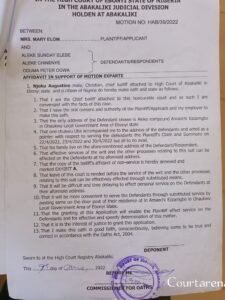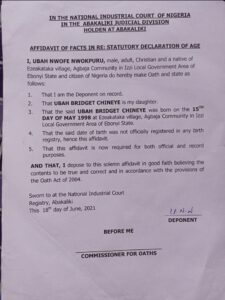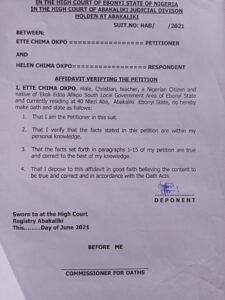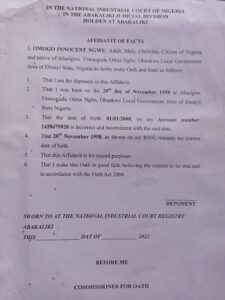Introduction to Affidavit in Nigeria
Affidavit in Nigeria, is written statement of facts which a person makes under an oath, confirming the content of his statement to be true to the best of his knowledge.
The oath so made, must be before an authorized person and in accordance with the provisions of the Oaths Act.
In Nigeria Courts, this authorized person is usually the “commissioner for Oath”
while the person who deposes to an affidavit is called the “deponent” or “affiant”
It is not actually the piece of paper you hold or see that is the affidavit. What makes that piece of paper an Affidavit is the attestation or swearing before the commissioner for oath. Once the document is not sworn to, it is not an affidavit, it is a mere piece of paper.
Contents of an Affidavit
By provisions of Section 115 of the Evidence Act 2011, an affidavit shall contain only Statement of facts and circumstances to which the deponent deposes to the affidavit.
The form of such affidavit may include:
- The heading of the Court.
- The full name, trade or profession, residence or nationality of the deponent.
- The Affidavit should be in the first persons pronoun and divided into paragraphs.
Requirement and Rules of Affidavit.
An affidavit must not contain objections, prayers, legal Argument or conclusion. See Section 115(2) of the Evidence Act. See also Izedonmwen v UBN PLC(2012) 6 NWLR (Pt 1295) P.1
Where a paragraph of an affidavit is extraneous in nature(i.e it contains argument, conclusion or prayers), the court is bound to strike out the paragraphs. Other Rules of Affidavit include:
- It must contain the oath clause
- It must be signed by the deponent
- It must be signed by the commissioner for Oath.
Who can depose to affidavit?
Anyone can depose to an affidavit. It is immaterial that the facts deposed to are not within the personal knowledge of the maker.
Where the facts deposed of are derived from another source other than the deponent, the law only require the deponent to state the source of the facts to which he deposes. See Section 115(3) of the Evidence Act 2011
Uses of affidavit
In Court. By the rules of Various courts of record in Nigeria, affidavits are used to accompany interlocutory applications.
Affidavits are also used in matters of fundamental rights and in originating summons. Affidavits are also used to verify facts in matrimonal proceedings.
Where an affidavit is used in court to accompany a motion, depending on the type of motion, an adverse party must challenge the content of the affidavit or the facts therein through a counter Affidavit or the facts in the affidavit, will be deemed admitted.
Outside Court: Affidavits are used for official purposes whenever an Act requires an Oath to be taken. Examples of this kind of Affidavit include: Affidavit for change of name, loss of Document, statutory declaration of age, correction of date of birth etc.
Defective Affidavit
Yes. An affidavit could be defective in nature and substance. A defective affidavit is an affidavit that has fallen short of the requirement of the Evidence Act, the Oath Act or any other relevant laws, by it’s form or content. See Onujabe v Idris(2012) 2 NWLR(Pt.1284) P.285(CA).
Again, an affidavit must be signed by the deponent, if not signed, it is not an affidavit. Section 117(4) of the Act Supra
Sample of Affidavit in Nigeria




Amendment of affidavit
An affidavit can be altered or amended before it is sworn. However, the law requires that any alternation, erasure or or interlineation made before the affidavit is sworn, shall be attested by the person before whom it is sworn, who shall affix his signature or initial in the margin opposite where the alternation or erasure was made. See Section 117(2) of the Evidence Act 2011.
After an affidavit has been sworn to, alteration on the affidavit is not allowed. Though, a commissioner for oath or anyone before whom the affidavit is sworn to may allow the deponent to resworn to the affidavit or demand that fresh affidavit be made. See Section 118 of the Evidence Act 2011.
In terms of affidavit that accompany motions in Court, affidavit cannot be amended.There is always provisions for further affidavit where necessary.
Thus, where a mistake is made, it is better to correct the error in the affidavit and refile the motion and affidavit.
On the date slated for the motion, counsel will pray the court to withdraw the one that is defective.
Affidavit by illiterate or blind person
An affidavit deposed to by an illiterate person or blind person must contain a jurat clause.
A jurat clause is just a brief Statement made at the foot of the affidavit by a person before whom an affidavit is taken, stating that the content of the affidavit was read and interpreted to the blind person or illiterate and he appeared to understand same before making his mark or signature.
Sample of jurat
” The content of this affidavit was read and interpreted to the blind/illiterate person by me from English Language to Igbo/Hausa language, and he understood same before making his mark.
……………………………..
Interpreter(Name, signature and date)
How to get Affidavit in Nigeria
Affidavits are drafted by lawyers and notary Public. You can as well walk into any Court premises and request for Affidavit. But for competency, it is adviceable, you contact a lawyer.
We can as well prepare it and email to you. Simply call 08148970746 or 07062392662.